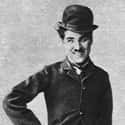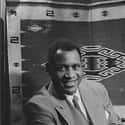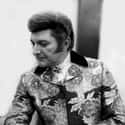-
(#1) Martin Luther King, Jr.
- Author
J. Edgar Hoover was obsessed with various forces in the American political landscape, and this included outspoken members of the Civil Rights Movement – given the Director's belief that the Movement was infiltrated and manipulated by communists. Martin Luther King Jr. was front and center of this obsession. In fact, when Hoover informed the Kennedy White House that some of King's advisors had communist ties, it was agreed that the Bureau would wiretap King, including the motel rooms that King resided in while traveling throughout the South.
It quickly became apparent that Martin Luther King was engaging in extramarital affairs, behavior that Hoover hoped to publicize through sympathetic media contacts. Frustrated when this attempt to discredit King failed, Hoover then instructed an underling to compose and mail a letter to King that included tape recordings of King's assignations and implied that he would be exposed and compromised. The letter stated “[lend] your sexually psychotic ear to the enclosure,” and it gave a deadline of a month “before your filthy, abnormal fraudulent self is bared to the nation.” It also denounced King as an “evil, abnormal beast.” King ignored the package and threat, initially opened by his wife, but he had no doubt that it came from the FBI. Hoover continued to publicly denounce King after the Minister alleged that the FBI was too tight with racist police forces in the South. Hoover called the Nobel Laureate “the most notorious liar in the country.”
-
(#2) Albert Einstein
- Physicist
Although Albert Einstein was well known as one of the most innovative scientists and thinkers of the 20th century, the FBI focused its surveillance on the German ex-pat's political activities, which had a decidedly leftist bent. J. Edgar Hoover equated liberalism with communism and, therefore, considered Einstein to be a secret Red sympathizer and a possible Soviet agent.
The FBI routinely tapped Einstein's phone, read his mail, and even went through his garbage in an attempt to connect him with sinister forces. In a biography of Hoover, written by scholar Fred Jerome, accounts of Einstein's former home in Germany, purportedly written by Hoover, describe it as "a Communist center" and "the hiding place of Moscow envoys," which disqualified him from participating in the US Army's Manhattan Project to construct the atomic bomb. Despite a 1,500 page file that was compiled right up until Einstein's 1955 death, no communist connection was ever discovered.
-
(#3) John Lennon
- Band/Musician
When John Lennon sang at a rally in December of 1971 for imprisoned activist John Sinclair, both the Nixon White House and J. Edgar Hoover went into beast mode to get the former Beatle and his wife, Yoko Ono, an American citizen, deported back to Great Britain. Richard Nixon was especially concerned that Lennon would be at the forefront of a movement to oppose Nixon's 1972 re-election campaign, the first presidential election to allow 18 year olds to vote. Senator Strom Thurmond, with information provided by the FBI, communicated directly with the Immigration and Naturalization Service and Nixon to inform them of John Lennon's UK conviction for marijuana possession, a pretext that would be used in an attempt to cancel Lennon's temporary visa.
The former Beatle was so intimidated by the US Government's explicit threats to deport him – as well as the visible FBI surveillance – that he canceled any activity on behalf of Richard Nixon's political opponents. Lennon's battle to stay in the US would continue after Hoover's 1972 death. Only with the election of Jimmy Carter in 1976 would John Lennon be granted permanent resident status. Eventually, files released from the FBI would show that J. Edgar Hoover made Lennon's deportation a top priority, so much so that a wanted poster was issued to local police departments with a picture of Lennon that stated that any arrest of him would make him immediately deportable. Typically, when it came to the Bureau's clueless persecution of rock and rollers, it was a photo of someone else.
-
(#4) Grateful Dead
- Band/Musician
Hoover and the FBI were convinced that rock and roll bands were somehow directly responsible for the proliferation of drug use in the '60s. One band that was supposedly knee deep in distributing LSD along the West Coast was the Grateful Dead, but the Bureau's files seem so out of touch as to render the suspicion ludicrous. The Dead are described in a 1970 official report as “a rock group of some sort.” Files also indicate that the band was one of several San Francisco-based acts that were an "internal security" threat from "the New Left."
FBI agents would routinely appear at Dead shows and were quite serious about the Dead's responsibility for massive amounts of LSD distribution. The final entry in their publicly available file is “LSD originates from San Francisco, California through a renowned rock group known as Grateful Dead. The Grateful Dead is well known to DEA, San Francisco.”
-
(#5) Jean Seberg
The treatment of American actress Jean Seberg by J. Edgar Hoover and the FBI was so egregious that it prompted a monumental Federal Senate investigation of the Bureau's operations and techniques. That's because, in the wake of the FBI aggressively harassing her on an international scale and fabricating slanderous lies about her pregnancy, Seberg committed suicide. Seberg appeared in several high-profile American films of the '50s and '60s, including The Mouse That Roared, Paint Your Wagon, and Airport. During the '60s, she contributed money to various activist groups, including the NAACP and Native-American organizations.
Hoover was reportedly particularly offended by the funding Seberg provided to the Black Panther Party. In 1970, the FBI helped concoct and plant a story in the mainstream media that Seberg's pregnancy was the result of a relationship with a Black Panther and not her husband. Upset, Seberg gave birth prematurely, and the infant subsequently died only days later. An open casket funeral of a Caucasian child refuted the FBI's subterfuge, and Seberg successfully sued Newsweek for printing the allegation. It is believed that Seberg was effectively blacklisted in Hollywood at this time, and she relocated to France where she continued her career in some memorable performances.
Still, she would be subjected to aggressive personal surveillance, burglaries, and phone wiretaps in France, Italy, and Switzerland. Her conduct and activities were routinely reviewed by both President Nixon and the Attorney General. Seberg officially committed suicide under mysterious circumstances in August of 1979, her loved ones alleging that her mental health had deteriorated under the stigma and systematic abuse of the clandestine campaign of the US Government. With Hoover already dead, the Bureau acknowledged misbehavior and instituted reforms prompted by the US Senate investigation known as the "Church Committee."
-
(#6) Pete Seeger
In 1942, while a Private in the US Army training to be an airplane mechanic, Pete Seeger wrote a letter to the California American Legion that was critical of the organization's official stance that – following WWII – all Japanese individuals, regardless of citizenship, should be deported. Seeger, the eventual composer of such American folk standards as "Where Have All The Flowers Gone?," "If I Had A Hammer," and "Turn, Turn, Turn!," did not receive an official response from the Legion. Instead, they turned the letter over to the FBI, which immediately began a lengthy investigation that prevented Seeger from being deployed with his unit once it finished its training.
In coordination with the FBI, military intelligence investigators began reading Seeger's correspondence with his Japanese-American fiancé and looking into Seeger's academic background. Seeger was never deployed into combat; instead, he was assigned to entertaining troops in the Pacific. But, after the war, the FBI did not forget about Pete Seeger. When his folk group, the Weavers, reached national prominence in the early '50s, blacklisting eventually diminished their appeal. Like many artists with politically provocative backgrounds, Seeger was eventually asked to testify in front of the House Un-American Activities Committee, and, instead of taking the Fifth Amendment or even providing information, he defiantly refused to answer questions. He was convicted of contempt of Congress and sentenced to a year in jail, but he eventually successfully appealed it. By then, the communist witch hunt had ended, but the Bureau would continue to closely monitor Seeger wll into the '70s; his FBI file stated that he "has manifested a revolutionary ideology." The FBI even communicated with the postmaster and police force of Seeger's tiny Beacon, NY, home, demanding that they report any suspicious activity.
-
(#7) Charlie Chaplin
- Actor
British-born Charlie Chaplin was another personal obsession of J. Edgar Hoover, especially because Chaplin's leftist leanings and non-citizenship made him an easy target during the early '50s. Hoover distributed damaging rumors and malicious innuendo about Chaplin to one of his go-to gossip columnists, Hedda Hopper. She faithfully chronicled alleged communist ties and dissolute behavior on the part of the Hollywood icon.
Chaplin became so unpopular that he decided to stage the 1952 premiere of his film Limelight in London, his American bookings having become nonexistent. Upon his exit from the US, Chaplin was informed that his permission to reenter the country had been revoked by the Attorney General. Chaplin was so alarmed and disillusioned by this – as well as subsequent political developments during the '50s – that he remained in Europe and only briefly returned to Los Angeles to receive an honorary Academy Award in 1972, a mere days before Hoover's death.
-
(#8) Eleanor Roosevelt
- Politician
Although J. Edgar Hoover worked closely with Franklin D. Roosevelt, he was relentless in pursuing and documenting the behavior and activity of the First Lady, Eleanor Roosevelt. Her FBI file has been described by historians as: "[One] of the wonders of the Western world. It is one of the largest individual files that Hoover compiled."
3,900 pages in length, FBI investigators documented Eleanor's affair with the much younger Joseph Lash. When FDR was informed of this liaison, Lash would be immediately reassigned within the military. Additionally, Eleanor Roosevelt's FBI investigation has been described as including:
“charges against her for suspected Communist activities, threats to her life on the grounds of her disloyalty to the country, close monitoring of her activities and writings, and a record of possible insurrectionary groups that she may have influenced.”
As with most progressives, J. Edgar Hoover suspected that Eleanor Roosevelt, a tireless advocate for human and civil rights, social justice, and feminism, was secretly a communist.
-
(#9) Melvin Purvis
- Person
In 1934, J. Edgar Hoover was involved in a very high-profile war against criminals like John Dillinger, "Pretty Boy" Floyd, and "Baby Face" Nelson. These criminals had mocked law enforcement for years, and Hoover publicly proclaimed that their apprehension was only a matter of time. In the summer and fall of 1934, this struggle came to a climax when FBI agents, led by Chicago office director Melvin Purvis, killed all three of these notorious gangsters in rapid succession. Despite Bureau attempts to limit his recognition, Purvis was proclaimed a national hero for his supervision of and personal participation in the shoot outs that killed the three criminals.
The attention, which upstaged Hoover, personally enraged the Director, who disliked publicity for any FBI employee other than himself. He began a systematic attempt to harass and discredit Purvis, which prompted the agent's resignation only a year after the high-profile events of 1934. Hoover's animosity didn't stop there. He attempted to prevent Purvis's employment in various opportunities, blocked two federal judgeships, and repeatedly refused to meet with Purvis when his former associate would drop into FBI headquarters in Washington. Hoover never reconciled with his former colleague, who died of a possible suicide on February 29, 1960.
-
(#10) Leonard Bernstein
Famed composer and conductor Leonard Bernstein came to the attention of the FBI in the early '40s for his supposed support of groups potentially harboring communist sympathies. Such information concerning Bernstein's interactions with or sponsorship of fundraising events connected to officially subversive organizations had disastrous personal consequences for Bernstein.
As a result of them, he was denied the renewal of his passport in 1953 at the height of the blacklisting and the House Un-American Activities Committee's furor over American communist infiltration. Bernstein's passport denial – undoubtedly prompted by the FBI's lengthy investigation into his background – forced him to undergo a humiliating process in which he was forced to disavow his previous connections, swear allegiance to the US, and deny any official Communist Party membership.
Following the hysteria of the '50s, Bernstein drew the FBI's attention again in 1970 when he famously sponsored a fundraiser for the Black Panther Party at his Park Avenue apartment. Although this high-profile event would prompt popular-culture mockery by Tom Wolfe, among others, for its "radical chic" behavior, it also set off an FBI attempt to discredit Bernstein by leaking word of his connections to a Black Panther murder suspect. Information from Bernstein's lengthy FBI file was only obtained after an ACLU lawsuit. Heavily redacted, it contains nothing of Bernstein's bisexual affairs, something the FBI would have undoubtedly unearthed. This precipitated additional lawsuits to force the FBI to release un-redacted and complete versions of Bernstein's FBI files.
-
(#11) Paul Robeson
Paul Robeson was a remarkable attorney, artist, athlete, and singer who also was an outspoken proponent of civil rights and an unabashed supporter of the Soviet Union in the '40s and '50s. To stop Robeson from traveling abroad and to limit his ability to earn a living as a singer and performer, in 1950, the US Government refused to renew his passport after he declined to swear to a loyalty oath that disavowed membership in the Communist Party and promised loyalty to the United States. He filed a lawsuit against the US Government, which eventually resulted in the restoration of his passport. By then, his notoriety rendered him unemployable, and his mental health began to deteriorate. In March of 1961, he allegedly attempted suicide in Moscow, an incident that his son would describe in terms of FBI intimidation:
"From the files I received, it was obvious that there were agents who did nothing but follow every public event of my father, or even of me... It took on a life of its own... Over time, even for someone as powerful and with as many resources as my dad had... the attrition got to him."
Robeson eventually returned to the United States but never disavowed his criticism of an American society he believed to be racist and oppressive. He died in Philadelphia in 1976. His FBI file totaled close to 2,700 pages.
-
(#12) Liberace
- Band/Musician
Wladziu Valentino Liberace, better known as the the performer and musician "Liberace," generated a 400-page FBI file that documented the closeted celebrity's homosexuality and gambling habits. Much of this attention was generated by a robbery of $25,000 worth of Liberace's jewelry from a Dallas hotel in 1974, which the FBI eventually solved. Although Hoover and the FBI did nothing overtly hostile to Liberace, he was an example of a celebrity whose unusual lifestyle was investigated and chronicled at Hoover's specific request.
New Random Displays Display All By Ranking
About This Tool
Under the leadership of J. Edgar Hoover, the FBI became the most powerful institution in the American judicial system. Under the special circumstances of the United States, John Edgar Hoover served as FBI Director for 48 years and 8 US presidents changed during his tenure. His influence and power even surpassed the president. He was both mysterious and terrifying and tried to destroy some celebrities who had no criminal background.
Hoover realized the importance of public opinion, and he began to interact well with the media, which laid a solid foundation for his propaganda and political struggle against crime in the future. As the head of America's largest intelligence agency, J. Edgar Hoover knew too many secrets. The random tool lists 12 famous historical figures that J. Edgar Hoover hated and tried to destroy.
Our data comes from Ranker, If you want to participate in the ranking of items displayed on this page, please click here.






















